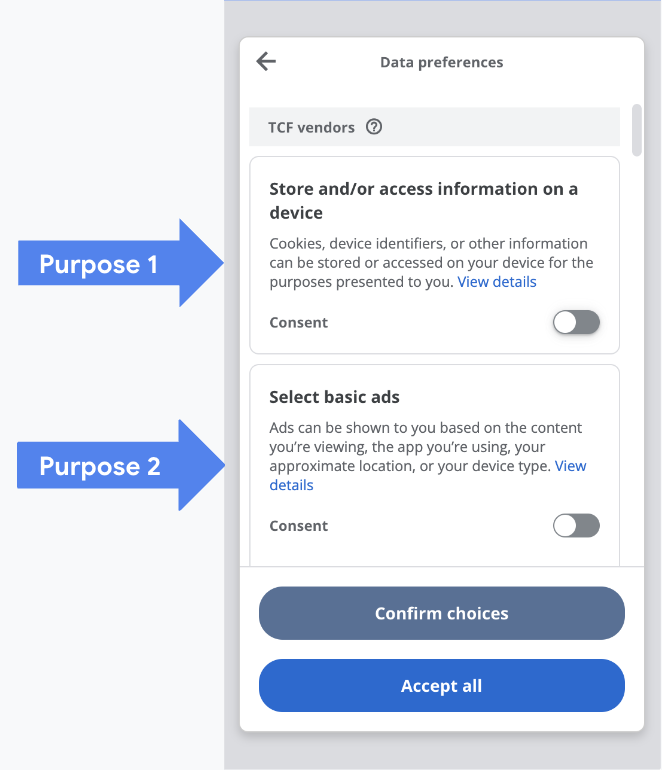Page Summary
-
Publishers in the EEA and UK must comply with Google's EU User Consent Policy by making disclosures and obtaining user consent for data usage related to ad personalization.
-
Compliance with the EU User Consent Policy requires adopting a Google-certified consent management platform integrated with the TCF framework, such as the User Messaging Platform SDK.
-
There are different types of ads that can be served based on user consent and other criteria: Personalized ads, Non-personalized ads, Limited ads, and Technical ad delivery.
-
Personalized ads require consent for multiple purposes and may utilize legitimate interest for some, while non-personalized ads still require consent for cookies and mobile identifiers.
-
Limited ads are served when there is no consent for cookies or mobile identifiers but legitimate interest may exist for certain purposes, and Technical ad delivery is a solution for serving ads when general consent or legitimate interest is absent.
Under Google's EU User Consent Policy, you must make certain disclosures to your users in the European Economic Area (EEA) and the UK, and obtain their consent for the use of cookies or other local storage where legally required, and for the collection, sharing, and use of personal data for ads personalization. This policy reflects the requirements of the EU ePrivacy Directive and the General Data Protection Regulation (GDPR). To comply with this policy, publishers are required to adopt a Google-certified consent management platform (CMP) that has integrated with the TCF framework such as the User Messaging Platform SDK. Once adopted, the CMP presents consent choices, known as purposes, in your mobile app.
The exact UI for the consent choices is kept up-to-date by Google, but here's an earlier version for reference:

The different types of ads that can be served are:
Personalized ads
Personalized ads are ads that make inferences about a user's interests based on the sites they visit or the apps they use. Google considers ads to be personalized when they are based on previously collected or historical data to determine or influence ad selection.Google will serve personalized ads when all of the following criteria are met. For more information, read requirements for personalized ads.
| Purpose | User consent choice |
|---|---|
| Purpose 1 | ✅ |
| Purpose 2 | ✔ or ✅ |
| Purpose 3 | ✅ |
| Purpose 4 | ✅ |
| Purpose 7 | ✔ or ✅ |
| Purpose 9 | ✔ or ✅ |
| Purpose 10 | ✔ or ✅ |
Non-personalized ads
Non-personalized ads are not based on a user's past behavior. Although non-personalized ads don't use cookies or mobile ad identifiers for ad targeting, these ads do still use cookies or mobile ad identifiers for frequency capping and aggregated ad reporting.Google will serve non-personalized ads when all of the following criteria are met. For more information, see Requirements for non-personalized ads.
| Purpose | User consent choice |
|---|---|
| Purpose 1 | ✅ |
| Purpose 2 | ✔ or ✅ |
| Purpose 7 | ✔ or ✅ |
| Purpose 9 | ✔ or ✅ |
| Purpose 10 | ✔ or ✅ |
Limited ads
Limited ads (LTD) disable all personalization and features that require using a local identifier.Google serves limited ads when all of the following criteria are met. For more information, read Launched: Limited ads 2.0.
- Special Purposes: 1, 2
- Legitimate Interest: 7 (optional only)